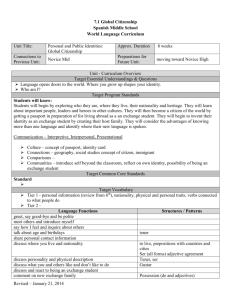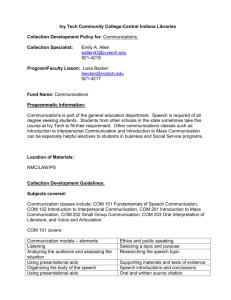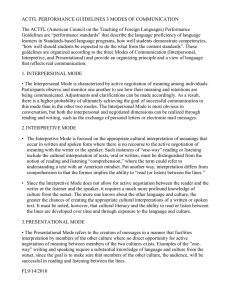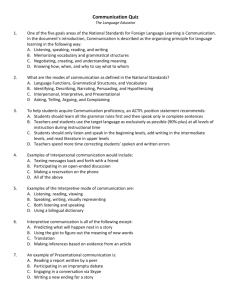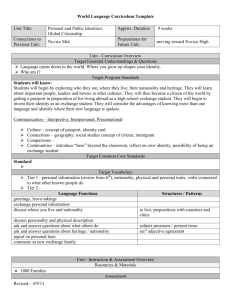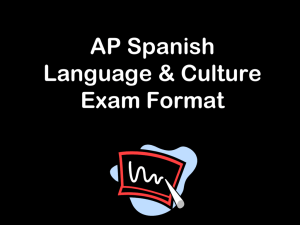French AP Syllabus 2014-2015 Course Overview
advertisement
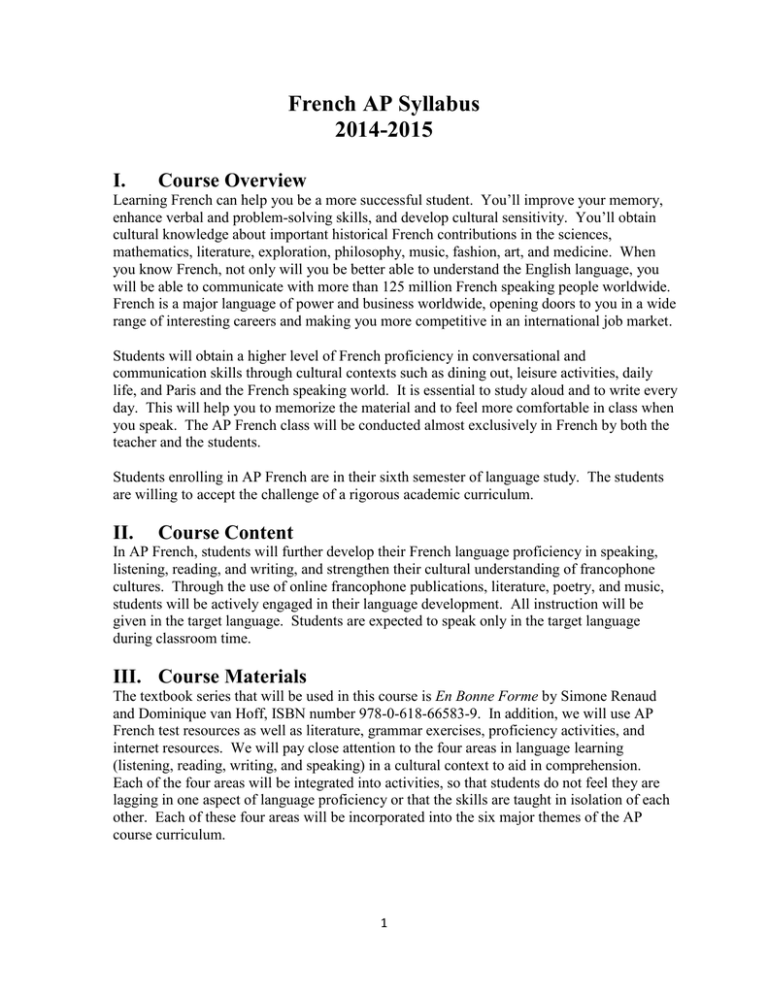
French AP Syllabus 2014-2015 I. Course Overview Learning French can help you be a more successful student. You’ll improve your memory, enhance verbal and problem-solving skills, and develop cultural sensitivity. You’ll obtain cultural knowledge about important historical French contributions in the sciences, mathematics, literature, exploration, philosophy, music, fashion, art, and medicine. When you know French, not only will you be better able to understand the English language, you will be able to communicate with more than 125 million French speaking people worldwide. French is a major language of power and business worldwide, opening doors to you in a wide range of interesting careers and making you more competitive in an international job market. Students will obtain a higher level of French proficiency in conversational and communication skills through cultural contexts such as dining out, leisure activities, daily life, and Paris and the French speaking world. It is essential to study aloud and to write every day. This will help you to memorize the material and to feel more comfortable in class when you speak. The AP French class will be conducted almost exclusively in French by both the teacher and the students. Students enrolling in AP French are in their sixth semester of language study. The students are willing to accept the challenge of a rigorous academic curriculum. II. Course Content In AP French, students will further develop their French language proficiency in speaking, listening, reading, and writing, and strengthen their cultural understanding of francophone cultures. Through the use of online francophone publications, literature, poetry, and music, students will be actively engaged in their language development. All instruction will be given in the target language. Students are expected to speak only in the target language during classroom time. III. Course Materials The textbook series that will be used in this course is En Bonne Forme by Simone Renaud and Dominique van Hoff, ISBN number 978-0-618-66583-9. In addition, we will use AP French test resources as well as literature, grammar exercises, proficiency activities, and internet resources. We will pay close attention to the four areas in language learning (listening, reading, writing, and speaking) in a cultural context to aid in comprehension. Each of the four areas will be integrated into activities, so that students do not feel they are lagging in one aspect of language proficiency or that the skills are taught in isolation of each other. Each of these four areas will be incorporated into the six major themes of the AP course curriculum. 1 Students will need their text and a writing utensil every day. For out of class homework, students should keep a notebook containing assignments and notes from class (Cahier de vocabulaire) and a folder for all handouts. These are items provided by the student: Writing utensil (any color but red) 3 Ring Binder for all assignments Colored tabs/dividers in the colors of pink, yellow, green, blue Folder Optional French dictionary IV. Resources Books: Amiry, Laila. Barron’s How to Prepare for the French AP Exam. 2004 Camus, Albert. L’Etranger. Lenard, Yvonne. Trésors du temps. Glencoe, 2005. Molière. L’Ecole des femmes. Reprise: A Review Workbook for Grammar, Communications, and Culture. Sagan, Francoise. Bonjour, tristesse. de Saint Exupéry, Antoine. Le Petit Prince. Sartre, Jean Paul. Huis Clos. Gallimard, 1947. Shein, Françoise. French Four Years. Amsco School Publications, 2006. Vary, Andrée and Claire Brouillet. Contes et legends du monde francophone. Glencoe, 1997. Magazines: Elle France-Amérique Think French Videos: Le Bourgeois Gentilhomme Au Revoir les enfants Cyrano de Bergerac 2 Paris, je t’aime Amélie Babette’s Feast Jean de Florette Manon of the Spring Websites: www.tv5.org www.espacefrancophone.org www.france24.com/fr www.rfi.fr www.lemonde.fr www.chantefrance.com www.celebrations.culture.fr www.louvre.fr www.musee-orsay.fr http://videos.tf1.fr/video www.thinkfrench.com French Podcasts Original French music modern artists such Patrick Bruel, Corneille, MC Solaar, Carla Bruni, Patricia Kaas classic artists such as Yves Montand and Edith Piaf V. Course Policies and Procedures It will be important to participate actively in and out of class to keep up. In the classroom, learning activities may be practice or graded. Be sure to seek help before a quiz or a test if you feel you are getting behind and are not understanding the material. Test corrections (rewriting a complete sentence correctly three times for every point lost) are offered after quizzes and tests for half credit of lost points. This reinforces grammatically correct phrases and prepares you for the following quiz or test. 3 Daily writing assignments sometimes will be graded, and sometimes not. There will be no credit given for late workbook assignments because we go over those together at the beginning of each class each day. Late compositions will not be accepted. Make up work is the student’s responsibility. A classmate can help you be aware of all homework. When you are gone for a day or so on pre-excused absences or gone for athletic events, etc. you must get work ahead of time and you are responsible for it immediately upon your return. (Quizzes and tests also are taken before or on the same days as the class.) Work missed during unexcused absences will receive no points. The classroom expectation is to aim for the Target Behaviors of being tolerant, open, appropriate, direct, respectful, accepting, positive and prepared. Digressions will be followed with reminders or conversations with the teacher. VI. Grading Policy Grades will be available about every two weeks so you may monitor your grade on an ongoing basis. Please work to maintain and improve it before grades are final. Your grade is based on homework, quizzes, tests, and participation. On quizzes, tests, and compositions, spelling errors (including gender errors) will be counted. Three mistakes in accent marks will be counted as one point. Cheating will be dealt with as laid out in the student policy handbook. Tests, quizzes, and daily assignments will be scored by points. The total of those points will be calculated into a percentage that will result in a letter grade as follows: 97-100% A+ 93-97% A 90-93% A- 86-89% B+ 83-85% B 80-82% B- 76-79% C+ 73-75% C 70-72% C- 66-69% D+ 63-65% D 60-62% D- 59% and below F 4 Daily participation points will be given on your use of time and use of spoken French (not correctness, but staying in the language) during class. One point per day will be given for arriving to class on time and staying in class the entire time. This point can be made up by staying after class one minute and speaking to me in French. Another five points are earned per week by the following rating: 5 You speak only French while you are in the classroom 4 You speak a good amount of French 3 You speak a fair amount of French but still some English 2 You speak a fair amount of English but still some French 1 You speak very little French 0 I did not witness you speak French Extra credit is given to students who have read or have heard of a current event of France or a French-speaking country and are prepared to summarize it to the class. Extra credit may also be given by pre-arrangement with the teacher to students who prepare a cultural dish to share with the class. Guest speaker are welcome and helping to arrange them may result in extra credit. 5 VII. Course Outline and Planner Summer Assignment: See the summer assignment sheet in Moodle. Weeks 1-5 Global Challenges Subthemes: Economic issues, Health issues, Human rights, War and Peace Overview: Begin by discussing in general current political issues facing the world and the importance of these issues. Compare and contrast the health systems in the US and France. Students will debate current topics, such as the Arab situation in France Learning Objectives: Students will describe the French and American governmental systems. Students will debate current events and controversial issues. Students will describe their own health and others including life-threatening health issues and how they are viewed by different countries. Sample Activities: Vocab: Government, health issues, political issues, economic issues Grammar and Reading: En bonne forme, Chapters 6, 16, and 2, and articles from Le Figaro, Le Monde, and Think French Listening: France 2 news and French Podcasts Presentational Speaking: Present research on an environmental issue, including audiovisual content Interpersonal Speaking: Perform a debate on a current topic such as global warming, cloning, or war in the Middle East Interpersonal Writing: Students will write an essay on a current topic such as the oil crisis, abortion, HIV research, cancer research, stem cell research, etc. Presentational Writing: Students will write a description of a new technology or discovery that is having a major impact on human life. 6 Weeks 5-8 Science and Technology Subthemes: Ethical Questions, Future technologies, Impact of social media, Impact of modern science Overview: Students will start with a survey to determine knowledge and interests in technology. Next, we will discuss new discoveries made by the French that have contributed to the scientific world. Finally, students will discuss ethical issues surrounding various advances in science. Learning Objectives: Students will describe various discoveries or breakthroughs of French scientists. Students will discuss the impact of various social media on a society. Sample Activities: Vocab: Various technologies, media, texting/email language, Grammar and Reading: En bonne forme Chapters 8 and 22, read articles from Le Figaro, Le Monde, and Think French Listening: News Reports from France 2, French podcasts Interpersonal Speaking: Students will give oral responses to newspaper editorials. Students will describe photos of new technology. Students will debate controversial subjects such as cloning, stem cell research, physician assisted suicide, the prevalence of social networking, etc. Presentational Speaking: Students will present a PowerPoint presentation on a new French scientific discovery. Students will create and explain their solutions to a current scientific problem. Interpersonal writing: Students will write responses to newspaper editorials. Students will create a blog where they discuss a current issue. Classmates must post comments on the blog. Presentational writing: Students will write a review of a recent scientific discovery. 7 Weeks 9-12 Contemporary Life Subthemes: Education, Leisure and Sports, Holidays and Celebrations, Housing and Shelter, Professions, Travel Overview: We will cover various aspects of students’ daily lives with the goal of being able to describe their personal lives and contrast them with others in the class and people from different cultures. This theme includes a lesson on the French education system contrasted with the American system. Learning objectives: Students will describe various aspects of contemporary life including schooling, sports, hobbies, housing, professions, and travel. Students will describe their current situation and future aspirations. Students will compare and contrast different school systems. Students will evaluate the role of sports in a society. Sample Activities: Vocabulary: schooling, grade levels, hobbies, housing, professions, travel, modes of transport, country names Grammar and Reading: En bonne forme chapters 1, 4, 5, 7, 12, 13, 15, Bonjour tristesse by Françoise Sagan, articles from Le Monde, Le Figaro, and other periodicals, job ads Listening: film clips from Paris, Je t’aime, interview of a French athlete, French podcasts Interpersonal Speaking: Students will record a past travel experience and if they would have that journey again. Students will act out job interviews. Presentational speaking: Students will choose one of three discussion questions regarding school systems and they will present their answers to the class. They will also prepare questions to pose to the rest of the class. The class is responsible for answering those questions. Students will present research on a francophone country. Students will present research about a sprot played in France or francophone country. Interpersonal writing: Students will write postcards from countries that they have visited virtually. Students will write a cover letter for a job application. Students will write a blog about the 35 hour work week, the amount of vacation time other people receive around the world, etc. Presentational writing: Students describe a sports competition that will appear in a French newspaper. Students will create a brochure in an attempt to attract people to their francophone country. 8 Week 13-18 Personal and Public Identities Subthemes: Alienation and assimilation, Beliefs and Values, Language and Identity, Multiculturalism, Nationalism/Patriotism Overview: Students will begin by brainstorming stereotypes of various cultures and discussing their origins. Then students will incorporate the themes of this unit into their discussions. Learning Objectives: Students will analyze judgments that they have made about other nationalities as well as their own Students will discuss the role of language (including slang) not just as a means of communication, but as a cultural identity. Students will discuss the role of various ethnic groups and what they contribute to a given society. Students will discuss the role of cultural identity and compare it to nationalism and patriotism. Sample Activities: Vocab: adjectives of description and nationality, idiomatic expressions, French slang, hobbies, interests, youth activities Grammar and Reading: En bonne forme Chapters 3, 11, and 14, articles from Le Monde, Le Figaro, Thinking French, excerpts from Un Enfant noir. Listening: film clips from Paris, Je t’aime, newscasts from France 2, podcasts Interpersonal speaking: Students will record an oral answer to what is the difference between nationalism and patriotism and what effect does it have on a society. Students will role play a scene between two friends in a café using French slang. Presentational Speaking: Students will present the stereotypes of a specific francophone country, where these ideas come from, and what can be done to eliminate them. Interpersonal writing: Write a blog about questions such as where to stereotypes come from and how to you change them. Students will write an advice column to help a student with a problem. Presentational Writing: Students will write an autobiography of themselves. Students will write an in-class essay on how their beliefs and values differ from that of another culture that they have researched. 9 Weeks 18-23 Families and Communities Subthemes: Childhood and Adolescence, Customs and Ceremonies, Family Structures, Friendship and Love Overview: Students will brainstorm family vocabulary. Students will discuss what does it mean to be a family. What is necessary to be a family? This then will lead to a discussion of what does it mean to be a friend and what is love? Learning Objectives: Students will describe their families and others. Students will discuss traditional and modern families and what constitutes a family. Students will discuss how they were raised and what they will do when and if they raise a family. Students will describe and discuss different customs and ceremonies in their culture and others. Sample Activities: Vocabulary: family, holidays and celebrations, emotions Grammar and Reading: En bonne forme Chapters 2, 9, 17, 18, 19. Huis Clos by Jean-Paul Sartre, articles from Le Monde, Le Figaro, and Thinking French Listening: clips from Paris, Je t’aime, clips from Au Revoir, les enfants Presentational Speaking: Students will record an oral discussion of their families and their family traditions. Students will pretend that they are soon-to-be parents and they will discuss how they are going to raise this child, including issues such as health, eating, and discipline. Interpersonal Speaking: Students will role play a family dinner. I will ask questions to participants during the dinner to encourage them to speak as the role that they are playing. Interpersonal Writing: Students will write a blog on a variety of family topics such as curfews, the generation gap, clothing, etc. Students will write a letter to a family member pretending that is 30 years later and they will describe what they have done. Presentational writing: Students will write an essay to describe a personal tradition or childhood memory and why they remember these particular things. 10 Weeks 24-29 Beauty and Aesthetics Subthemes: Architecture, Ideals of Beauty, Literature, Music, Performing Arts, Visual Arts Overview: This theme includes a lesson on some of the most famous artists, musicians, films, cuisine, and literature in French and francophone culture. Learning Objectives: Students will describe various art products (film, painting, books) and their preferences. Students will cite various well-known French (and francophone) artists, musicians, actors, etc. Students will discuss what art is and the role of art in society. Sample Activities: Vocabulary: fine art, poetry, music, literature terms, descriptions, film genres, descriptions of movies, theater terms, food and restaurants Grammar and Reading: En bonne forme Chapters 10 and 20, L’Ecole des femmes de Molière, le Petit Prince de Antoine St. Exupéry, articles from Le Monde, Le Figaro, Thinking French, specific art magazines, travel brochures from various architectural sites in France and francophone countries Listening: clips from Paris, Je t’aime, Cyrano de Bergerac, French podcasts, French artists such as Patrick Bruel, Edith Piaf, MC Solaar, French film trailers Interpersonal Speaking: Students will act out scenes from films with input from the class. Students will debate aspects of art such as violence, obscenity, etc. in movies as well as traditional forms of art. Presentational Speaking: Students will present research to the class on a French artist or composer. Students will make a recording of their art preferences. Students will select a French painting and analyze it for the class. Students will present a traditional French recipe and discuss what is in it, how to prepare it, from which region it originates, why they chose it, how it is served, and then serve it to the class. Interpersonal Writing: Students will write a blog about the role of art in their lives and the role of art in society. Presentational Writing: Students will write their own fable as La Fontaine. Students will give an explication de texte of a poem of their choice. Students will write a review of a French movie. 11 Week 30-32 Review for and take AP Exam. After the AP exam, students will read a French novel of their choice and prepare a PowerPoint presentation for the class giving its plot, main characters, themes, etc. Students will also write a 2 page paper discussing how it reflects the literary movement of the time that it was written. Students will be given a list of potential novels from which to choose. AP French Please sign and return, indicating that you have read and understand the expectations and policies stated in the syllabus. Parent Signature: ______________________________________ Student Signature: ______________________________________ Date: ___________________________ 12
